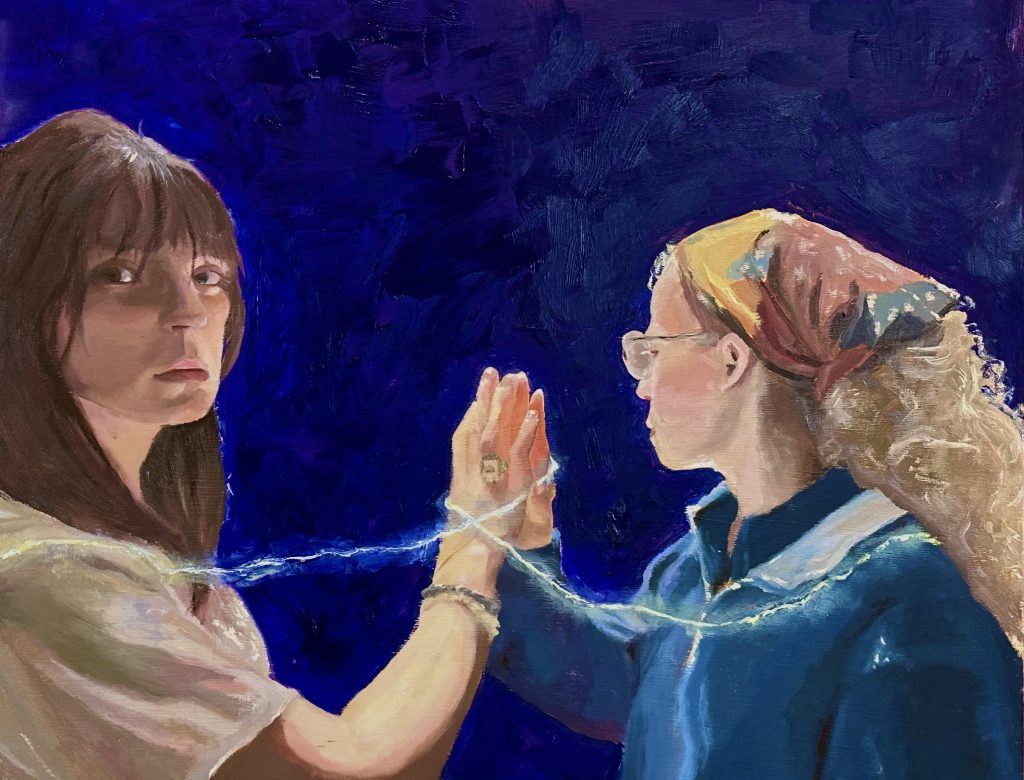This is how you smile: Cracked lips pulled back, cheeks flushed, the corner of your eyes crinkled. You were always told you had a beautiful smile, but it is your biggest insecurity. You may have perfect, cupid-bow lips, but your teeth are crooked and disjointed, and your grin always seems too big for your face. In your bathroom mirror, you practice smiling modestly, stretching your lips minimally, squeezing them shut. You cry with frustration as your features refuse to configure into that of a stranger’s.
This is how you cry: Heaving breaths, wailing. You’ve always found it difficult to express your emotions with words and maturity. Your hands move as you weep, pulling at your hair, scratching at your arms, before wrapping themselves around your chest and shoulders, holding you tight. When you grow older, you learn how to cry softly, holding your breath before exhaling a sob into the crook of your elbow.
This is how you grow: Quickly. Sprouting up, taller than your mother now, but without any of the eloquence that she carries herself with. You aren’t sure what to do with your gangly limbs. You groan in disgust as you run your fingers over the pustules that litter your face. You spend an afternoon squeezing them between your thumb and index fingers until they pop. You go to bed with the remaining scabs littering your face. You spend your days poring over photo albums with pictures of little you, face smooth and soft, running your hands over the pages with reverence. You are no longer a child. No one treats you like one anymore.
This is how you hug: Tightly, and with fervor. You are terrible at articulating your emotions, good or bad, and so you scream, you cry, and you hug. You pull people close, wrapping your arms above their waist, inhaling into their shoulder, and squeezing tight. You hold them close, feeding off their warmth like you need it to survive.
This is how you kiss: With the slight air of someone who doesn’t know exactly what to do. No matter how many times you’ve done this dance, you can never quite get it right. Your lips are too eager and your limbs are too long, and no one ever asks you to stay out past curfew, so you sit in your room instead, avoiding the mirror as you scrub your makeup off.
This is how you leave: With a ring on your finger, in the arms of your lover. You ignore the urge to run back into your mother’s arms as you walk down the front steps of your childhood home. This will be good. You are an adult now.
This is how you love: Properly. You’ve always found it difficult to express your strong emotions, but you’re always able to keep your calm with your husband. You don’t feel strongly about him anymore, you know, but you stay anyway, for now you have children who need you to love them too. Your motherhood has taught you the art of patience and an ability to put your children first. You love your children, as they rush through the door each afternoon with stories of their elementary classrooms. And you love your children, hands clenched at your side, as they scream in the grocery store aisles, anger in not getting a toy painting their faces redder and redder. You learn to love as a sweet woman should. You learn to love everyone.
This is how you die: In a hospital bed, heart monitor near your left ear, beeping away in a steady rhythm. Your eyes are closed, and you see purple stars against your eyelids. You breathe, inhaling shakily and exhaling with a croak. Your children sit on either side of your skinny little hospital bed, each holding one of your skinny little hands. They say words that you don’t quite catch, that you don’t quite care to. You feel peace. It’s a new feeling, one you’re sure you haven’t experienced before, but you like it very much. Inhale with a stutter. Exhale.
Eva Rami is fourteen years old, and is currently a freshman at Kinder High School for the Performing and Visual Arts, where she studies creative writing. She has been published in the Silly Gal Magazine and Cathartic Literary Magazine, among others. Her work has been recognized in the Scholastic Arts & Writing Awards. When not writing, Eva enjoys making herself laugh, attending poetry performances, and trying to get inspired.
